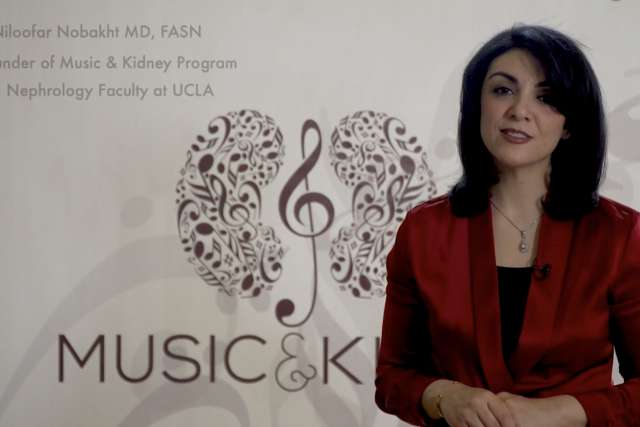From lullabies to classical music concerts, from love songs to workout soundtracks, music has long formed a backdrop to our lives. It can transport listeners, evoke emotions and bring back memories.
But while many of us turn to music for entertainment or as a diversion, Niloofar Nobakht, MD, a kidney specialist, associate clinical professor of nephrology at the David Geffen School of Medicine at UCLA and director of UCLA’s Music and Kidney Program, believes it also has the potential to heal.
Dr. Nobakht is focusing on whether music can help patients with chronic kidney disease who are undergoing dialysis, a lifesaving yet time-consuming and inherently stressful reality for more than a half-million people in the United States.
What it’s like to have end-stage kidney disease
About one in seven adults in the U.S. has chronic kidney disease, Dr. Nobakht noted. As the disease progresses, the kidneys cease being able to function. For some, this end stage of kidney failure comes on quickly; for others, there’s a gradual decline over a number of years until the kidneys are functioning at just a fraction of their capacity.
This results in elevated blood pressure and a build-up of waste products in the blood (primarily urea and creatinine), which is fatal if not treated via regular dialysis or a kidney transplant.
Even patients who are considered medically eligible for a transplant may undergo regular dialysis while they await the procedure. But the wait for a transplant can be long: after passing the medical screening to be eligible to receive a kidney, it can take several years, according to the National Kidney Foundation. In some parts of the country, including in Southern California, the wait can easily stretch to a decade.
Patients at this point are likely experiencing a range of physical symptoms, including pain, poor appetite, nausea, shortness of breath, lack of energy, swelling of their extremities, and a decrease or complete cessation of urination.
There are also psychological symptoms and quality-of-life aspects of end-stage kidney disease, Dr. Nobakht said. “Anxiety, depression, poor appetite, not sleeping well – they’re all part of the package,” she explained.
Dialysis, while lifesaving, is another stressor, she noted. Once the kidney function has declined to about 10% or less of its capacity, patients generally undergo the three- to four-hour treatment three days a week at a dialysis center.
Many patients first need to have a surgical procedure to provide ongoing access to an artery and a vein, usually by creating an arteriovenous fistula that joins the two to create a single access point. Then, at each visit, the patients’ blood is extracted from the body via needle, filtered via the dialysis machine and returned to the body.
“This is how people are spending a big chunk of their time,” Dr. Nobakht said. “And there are noises, there are alarms, the patients’ chairs are close together – it’s not a peaceful environment.”
Can music help? The evidence to date
Given all of this, Dr. Nobakht wondered, “How can we disconnect them from all of this stress, at least temporarily?”
The answer, she believes, may one day include a “prescription” for music.
The history of using music to soothe patients dates to Hippocrates and Plato, Dr. Nobakht noted, adding that it’s been shown to have both mental and physical effects.
Music provokes a “learned cognitive response,” she explained. “It can increase some of the activities of brain neurotransmitters, such as dopamine or serotonin, which help with positive mood. These ‘happy hormones’ are also important for stress reduction,” she noted.
“The connection of mind and body is significant,” she said. “When we look at physiological measures, such as blood pressure, heart rate and respiratory rate, the potential effect of music is noticeable.”
To date, music has been shown to benefit a wide range of patient populations, including those with cancer, hypertension, lung disease, Parkinson’s disease, pain, depression and anxiety, Dr. Nobakht said. However, the effects have varied based on differences in methodology, such as exposure to music, the type and severity of the medical condition and personal preferences.
Previous studies have shown that playing music during surgical procedures can help with pain and anxiety. And for patients with chronic conditions, music can be beneficial because it can help lessen anxiety, depression and sleep issues.
For patients undergoing dialysis, specifically, music has been shown to reduce cortisol levels as measured via saliva, Dr. Nobakht said. Higher salivary cortisol levels have been linked to increased rates of cardiovascular-related death, she noted.
The genre of music can make a difference, Dr. Nobakht said. She cited a randomized controlled study examining the cardiovascular effect of listening to ABBA, Mozart or Strauss: only the participants who listened to one of the classical music options showed a decrease in blood pressure and heart rate, while those who listened to ABBA did not.
Some of the effects may be based on the genre itself, Dr. Nobakht noted, but individual preference may also play a role.
In order to establish guidelines for the use of music to improve health outcomes, more research studies tailored to specific patient populations and individual preferences are needed, she said.
Studying benefits of music and VR
The new trial, which is expected to launch in the fall, has been designed to measure the effects of individual music preferences and of virtual reality on patients undergoing dialysis at UCLA. Participants will spend six weeks undergoing dialysis as usual, six weeks listening to the music of their choice during their treatments, and six weeks immersed in virtual reality via a headset while being treated.
During the music portion of the study, participants can choose from a playlist featuring a wide range of musical genres. The music algorithm will suggest similar choices based on the options participants select, Dr. Nobakht said.
For the virtual-reality module, the participants will be able to select a soothing immersive environment such as a nature scene.
The study is being jointly developed by Dr. Nobakht and Robert Bilder, PhD, professor of psychiatry and bio-behavioral sciences at the David Geffen School of Medicine at UCLA.
To assess the psychological aspects of the interventions, participants will complete questionnaires following their treatment sessions, Dr. Nobakht said. Physiologic measures such as blood pressure, heart rate and respiratory rate will be measured as well.
The goal is to provide evidence-based results to quantify the potential benefits that music and virtual reality can provide, Dr. Nobakht said.
“I might be able to say, ‘music can be relaxing and beneficial,’” she said. “But in order to apply it as a therapeutic intervention, we need further research that includes results from different patient populations.”
Although the study results aren’t expected to be available for about a year or so, she’s hopeful they will add to the growing body of evidence that music can be a “complementary, non-pharmacological, non-pricey tool” to augment conventional treatment.
“Investigators and scientists from different disciplines, such as nephrology, neuroscience, psychology, pain management and palliative care, can come together, in concert with patients, to develop a holistic approach using music and visual art to treat the collection of debilitating symptoms they experience,” she said.
Lisa L. Lewis is the author of this article.




